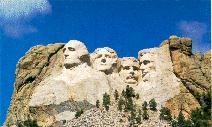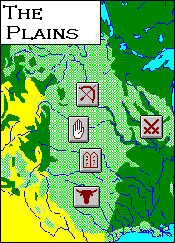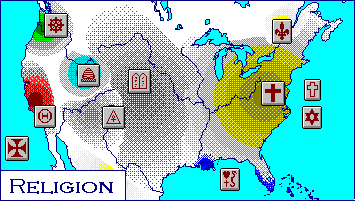New Israelites

Because the alien cultures of the West have alien spiritual needs, Non-Denominational influence fades beyond the eastern farmlands. The nomadic herdsmen of the Great Plains have no towns, and therefore no churches. With a society structured by simple kinship, they also have no room for a fancy religious heirarchy. Elders and charismatic prophets instruct the people in the laws of God.
The cowboys strictly believe that Jesus was the Son of God and the Saviour of Man, but their lifestyle is so similar to the lifestyle of the early wandering Israelites that they have also taken a fundamentalist view of the Old Testament and its laws. They've resumed the Judaic taboo on pork because the hog is a dirty creature of the hated farmers, not a proper animal for a herdsman to bother with. They've restored the taboo on images so they don't have to tote around Madonnas, Pietas and the icons of a hundred saints. Lacking jails and dungeons, they practice immediate justice by exile, mutilation and execution by stoning. They circumsize their men and segregate their menstruating women from decent folk.
The Black Hills have a special significance to the New Israelites, and in times of spiritual crisis, a person will make a pilgrimage here in order to meditate and seek guidance. By common consent, the hills are considered neutral territory, and no pilgrim - not even one from an enemy tribe - is molested in his travels. The Black Hills therefore have become the site of several informal and spontaneous monastaries, which lack any permanent structure, but grow and fade as pilgrims come and go. The New Israelites also treat the faces at Mt. Rushmore with superstitious awe, and they consider this point to be the bridge between earth, heaven and hell.
For religious holidays, they've reverted to a lunar calendar, because it's easier for nomads to watch the phases of the moon than it is to measure the sun's shadow on unfamiliar ground. Their holiest festival is Easter/Passover (the week of the first full moon following the spring equinox) and its associated holidays such as Lent and Pentecost. They also celebrate Christmas (the first new moon following the winter solstice) with bonfires to rekindle the sun; and the Day of Atonement by chasing a scapegoat into the wilderness.


Last Updated April 1999
Copyright © Matthew White 1999